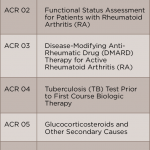
Natalya Kokhanova / shutterstock.com
We all have a short list of famous individuals whose writings inspire us and guide us. At the start of my presidential year, I turned to my own short list for some words of wisdom from Peter Drucker, whom many consider to be the founder of modern management theory. Underpinning Drucker’s teachings is a strong belief that success in anything begins with effectiveness. To be effective within any organization, he notes that one must never ask “What do I want to do?” Rather, one must ask: “What needs to be done?” followed by the next equally important question: “What is the right thing to do for the organization?”1
As I look back over this past year, I see the efforts of many talented and dedicated volunteers, who, together with our outstanding staff, have repeatedly asked these two key questions as they approached their work on our various ACR committees. It is not so surprising, then, to see how effective they have been and how much they have accomplished for all of us. It has truly been my honor to serve with them.
Advocacy
The work of our advocacy team never ceases. They must repeatedly step up to draw the attention of our nation’s leaders to issues that adversely affect our daily ability to care for patients, including the requirements to follow step therapy and obtain prior authorizations for necessary treatments—plus the many other administrative burdens that interfere with access to care on so many levels.
Through their efforts, the proposed consolidation of evaluation and management codes (which would have resulted in disastrous cuts to Medicare reimbursement in cognitive, time-intensive specialties, such as ours) has been replaced by a proposal from the Centers for Medicare & Medicaid Services that promises to more appropriately value the time and expertise that we in rheumatology provide to our patients. Likewise, we have been able to gain bipartisan support in both the House and the Senate for bills that would eliminate or streamline the requirements for step therapy.
As we continue to push for these changes and others, the path the ACR must walk to be effective on Capitol Hill is narrow and straight down the middle of the aisle.
RISE & the Ascent of Data-Driven Approaches
The RISE registry is now the largest rheumatology registry in the world, with data collected on almost 2 million patients to date. It is truly amazing to look back and see how far we have come, just five years after the registry was launched—an accomplishment that serves as another testament to the effectiveness, and truly the passionate commitment, of our volunteers and staff. At the RISE Summit this past May, a cross-sectional representation of our specialty met to chart the strategic direction for the next phase of our registry, which included capturing patient-reported outcomes and improving clinical outcomes through benchmarking and specific quality outcome measures, as well as developing ways to use the longitudinal data collected on our patients for robust clinical investigation, especially in rare diseases.
All the while, RISE continues to serve our practice community by helping all RISE participants successfully meet the requirements for value-based reimbursement through the Merit-Based Incentive Payment System. If the rapid ascent of the RISE registry these past few years is any indication of the speed and steep upward angle of its future trajectory, I expect we will see RISE continue to transform our specialty for the benefit of our patients.



